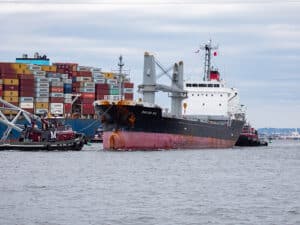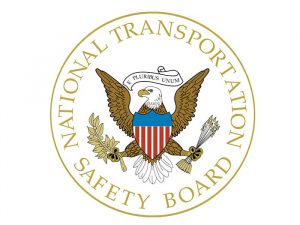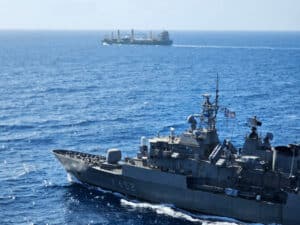
Red Sea is becoming a no go zone for shipping
Written by Nick Blenkey
What will Operation Prosperity Guardian do ? “I’m certainly not going to telegraph any punches one way or the other,” National Security Council's Admiral John Kirby said at a White House briefing. [Screengrab from CSpan]
Supply chain disruptions as a result of Houthi attacks on merchant ships in the Red Sea are only likely to increase. A growing number of ship operators have themselves decided to suspend operations through the area and yesterday the Norwegian Maritime Authority effectively made the Red Sea pretty much a no go area for Norwegian ships.
“Today, the Norwegian Maritime Authority decided to raise the security level in the southern part of the Red Sea to the highest level, level 3,” it said. “This means that operational restrictions will be put in place, and transit through the area will be discouraged.”
“We have recently seen several serious attacks on civilian ships. The militia responsible for the attacks claims that they only target ships with ties to the conflict in Israel. However, due to the uncertainty surrounding the information used to target ships, the decision has been made to elevate the security level. While Norwegian ships are not prohibited from navigating through the area, the elevated security level sends a clear message that the situation is ambiguous and has worsened,” said Knut Arild Hareide, Director General of Shipping and Navigation, adding: “Traffic in the area should be avoided.”
Security level 3 implies that Norwegian-registered ships are not permitted to call at ports in the geographical area covered by security level 3. Although sailing through the area is still possible if deemed justifiable by the shipping company, the Norwegian Maritime Authority recommends avoiding such traffic until the situation changes.
“We are aware of various international and Norwegian initiatives aimed at enhancing security. The NMA will continually evaluate. If changes result in increased security, we are prepared to lower the security level accordingly,” said Hareide.
ITF SAYS SEAFARER SAFETY COMES FIRST
The International Transport Workers’ Federation (ITF) is calling for the safety of seafarers to be paramount.
“We acknowledge the steps taken by a number of leading shipping companies including Maersk, Hapag Lloyd, and MSC to stop using the Red Sea, and many vessels have been rerouted to avoid putting seafarers’ lives at risk,” said ITF. “We welcome the news that BP and oil tanker group Frontline have temporarily halted traffic through the Red Sea.”
The ITF says that it recognizes that the Red Sea route including the Suez Canal is a critical part of the global supply chain and that taking the alternative route around the Cape of Good Hope extends the journey by over 3,000 nautical miles – potentially adding weeks to the time seafarers will be at sea.
Rerouting will have a significant impact on tours of duty in the global supply chain, but most importantly, says ITF, it will reduce the risks to seafarers that the Red Sea currently brings.
Stephen Cotton, ITF general secretary said: ‘’The primary concern of the ITF is the safety of seafarers and we would expect shipping companies to share that concern. Seafarers move the world. We applaud companies that are rerouting their vessels. The focus at this time needs to be about the health and safety of the seafarers and less about the cost of oil and transport.’’
OPERATION PROSPERITY GUARDIAN
While a few more details are starting to emerge about Operation Prosperity Guardian, the security initiative being coordinated by the U.S. in response to Houthi attacks on shipping in the Red Sea, they add little to what we initially reported on December 18, namely that it will operate under the umbrella of the Combined Maritime Forces and the leadership of its Task Force 153, which focuses on security in the Red Sea.
Yesterday, Admiral John Kirby, coordinator for Strategic Communications at the National Security Council told a White House press briefing that “now ships and aircraft from multiple nations are and will continue to join the United States in conducting maritime surveillance and taking defensive action as appropriate to protect commercial ships from the threat posed by the Houthis.”
“From the beginning, we’ve said that this is an international challenge; it requires collective and international action.” said Kirby. “And we’ve been able to bring together now a number of partners, including the United Kingdom, Bahrain, Canada, France, Italy, the Netherlands, Norway, Seychelles, Spain, and even more to address this challenge together.
“Also today, in a related fashion, the United States and the world’s largest flag states for commercial vessels transiting the Red Sea also issued a joint statement condemning, in the strongest terms, the threats and the acts by the Houthis.
“This joint statement has 44 signatories, including NATO, the entire EU and G7, as well as Australia, Canada, Bahamas, Malta, New Zealand, Singapore, and Yemen.”
You can read the joint statement HERE
At this stage though, it remains unclear what countries are contributing how much — particulary in terms of additional warships — to the operation. Also unclear is what measures Operation Prosperity Guardian will take to counter the Houthi threat in the Red Sea
“I’m certainly not going to telegraph any punches one way or the other,” said Admiral Kirby in response to a question at yesterday’s White House briefing.




